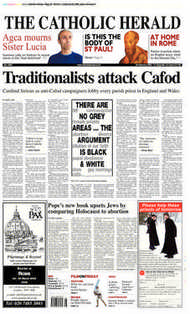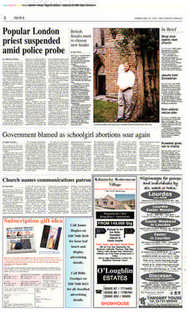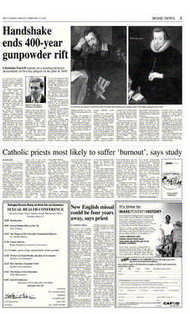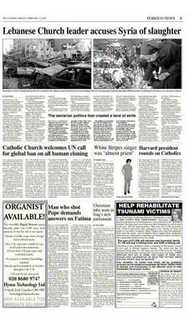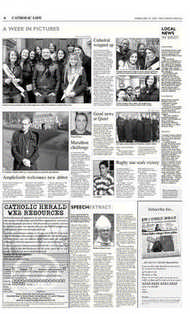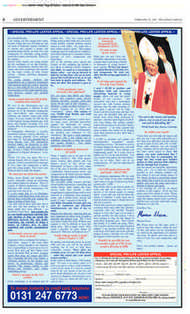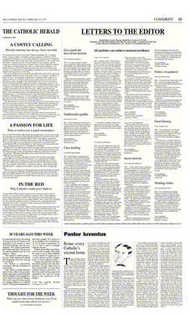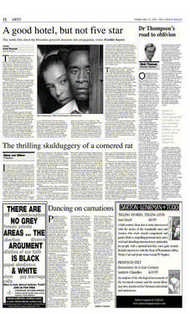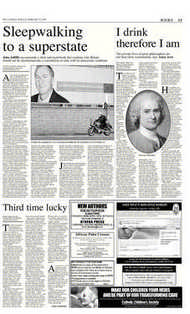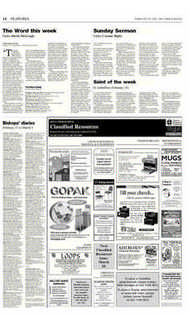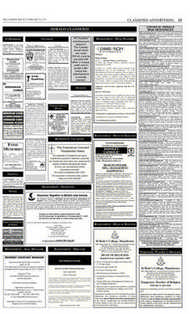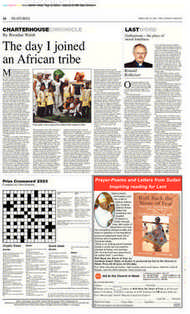Page 7, 25th February 2005
Page 7
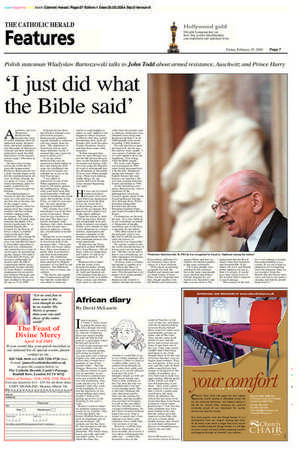
Report an error
Noticed an error on this page?If you've noticed an error in this article please click here to report it.
Tags
Share
Related articles
Leaders Say Farewell To Cardinal Lustiger
Europe
Polish Professor Is Fined For Lecturing
Polish Professor Is Refused Exit Visa
Holocaust Cannot Be Forgotten, Says Pope
Polish Writer Applies For Visa
‘I just did what the Bible said’
Auschwitz survivor Wladyslaw Bartoszewski became the focus of world attention when he addressed nearly 40 presidents and prime ministers and thousands of Holocaust veterans and their families gathered to mark the 60th anniversary of the concentration camp’s liberation in January.
On television screens across the world the 82year-old, bespectacled Professor Bartoszewski cut a frail, stooped figure as he led the commemoration service. To Poles, though, he is a giant of a man; a hero whose unstinting quest for justice symbolises the country’s long struggle for freedom.
His imprisonment in Auschwitz laid the foundations for a life that was to see him rise to become one of the county’s most respected figures. After his release from the camp he worked with the wartime Catholic underground movement, The Front for the Rebirth of Poland; then, realising the plight of his Jewish countrymen, he cofounded Zegota (the Council for the Rescue of Jews), which is credited with saving more than 4,000 lives. The courage he demonstrated fighting fascism was matched by equally principled opposition to the post-war communists who jailed him for a total of seven years on trumped-up spying charges. The author of more than 40 books, he served as ambassador to Austria after the fall of communism before being appointed foreign minister by Lech Walesa. A tireless campaigner for reconciliation between Germany and Poland, Bartoszewski was later recalled to the post at the age of 78 in 2000. Although he has been described as Poland’s resident moral compass, Bartoszewski modestly regards himself as someone who has simply done his duty: “My experience at Auschwitz had an enormous influence on me. I realised that one cannot be passive about evil.” At an age when Bartoszewski says he should have been falling in love and taking his first steps into adulthood, the high-school student was rounded up in one of the first Nazi purges.
“I was taken to Auschwitz as one of the Poles captured in mass raids by SS police against the intelligentsia. These raids were held from May until September 1940 and aimed at breaking the moral spirit, the backbone of the Poles, in order to scare people,” he said, speaking through an interpreter.
“My number was 4,427, indicating I was in the first group of prisoners. There were no gas chambers at that time. But there was bestial treatment, daily beatings with clubs, hunger, and work beyond one’s physical capacity, without any consideration to health or age.” During the seven months that Bartoszewski was held in Auschwitz half of the prisoners died. “These people didn’t die in gas chambers. They were beaten to death, died of exhaustion and died from untreated disease. The conditions were as bad, or worse, than those endured by English prisoners of war held by the Japanese. The difference was we were civilians, not soldiers.
“The horror and tragedy that I experienced and the fact that the world didn’t care about it made me realise it could happen to others as well. Indeed it did happen to others, because in March 1942 they started transporting Jews from all Europe; first from Slovakia, France, Germany, Austria and then from many other countries.
“It then emerged that what we went through was not the full picture because later on this became a place of murder and killing without even using the disguise of work to exterminate people. Hundreds of thousands of Jews were killed straight away. These were unimaginable things. So my instinct that I was facing some infernal happening was right.” He was one of several hundred political prisoners who were freed following international pressure from the Red Cross, for whom he’d worked during the early part of the occupation. But Bartoszewski couldn’t rest while others suffered.
Upon his release in April 1941 he moved to Warsaw and immediately took part in the resistance movement. Within a few months he had sworn allegiance to a secret military organisation and become a member of the underground Home Army that undertook perilous sabotage operations.
At that time the Nazis deported around 300,000 Jews from Warsaw. “We all knew what was happening and I knew we had to do something about it,” he said.
Bartoszewski worked with the writer Zofia Kossak-Szczucka, setting up Zegota to provide shelter, food and medical aid with funding from the government-in-exile in London. Many women and children were taken to convents, while false documents such as baptism certificates were obtained from clergymen Bartoszewski knew. In all 4,000 people were saved, including 2,500 children.
His role put him at great personal risk, but he says his motives were simple: “I was raised a Catholic and we were taught to love our neighbour. I was doing what the Bible taught.” His work with Zegota was recognised in 1963 when Israel decorated him with the title “Righteous among the Nations”, the highest honour the state bestows on non-Jews. He was later granted honorary Israeli citizenship in 1991.
At the Auschwitz ceremony, Bartoszewski, who is chairman of the International Auschwitz Council, spoke ahead of the French politician Simone Veil, Romani Rose, Polish President Aleksander Kwaniewski, Russian President Vladimir Putin and Israeli President Moshe Katsav.
Commenting on the task, he said: “It is very difficult to say something on behalf of thousands of people, something that would have a meaning for the future.
“One didn’t need to tell the prisoners what it was like and to tell the non-prisoners the history of Auschwitz was impossible.” He said he wanted to tell the world that the lessons of history must not be forgotten. “All that can be said is that it was a horrifying, terrible experience for humanity in the 20th century.
“It shows what a totalitarian regime is capable of if one rejects the ideas of humanitarianism and tolerance. This thought has to be passed on to young people.” Those people Bartoszewski wished to address include the errant Prince Harry, pilloried for his infamous fancy dress choice of a Nazi uniform.
“Poles share an amazing sympathy for both the English and Americans and we think kindly of them. Poles haven’t forgotten that they fought together with the British and Americans against Hitler and that our soldiers are buried together in the same cemeteries.
“Of course people were irritated by this incident, but at the same time people were satisfied that Prince Charles thought his son should visit Auschwitz and take a lesson from it. We understand that the Royal family finds him immature and irresponsible. If his father can see it and British public opinion can see it, then it is alright. It would have been much worse if the incident didn’t generate as much outrage.
“The essence of the mat ter is not making a mistake but understanding it was wrong. If we can accept an admission of wrongdoing from the Germans, then we can accept it from the British that the Prince feels sorry and knows he made a mistake and that he should learn from it.”
blog comments powered by Disqus


